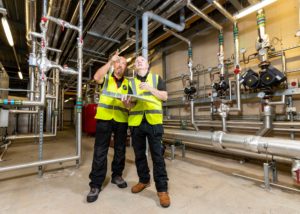Last month, I arrived in an exciting, brand-new role with SPACE FM. With over five years’ experience working in facilities management, I was excited to join a business who have spent the last 26 years helping companies to transform spaces, and optimising how these spaces work for the people that inhabit them. Facilities management is a central component of our transformative work.
In recent years, the workplace landscape has undergone significant changes. The developments we’re seeing are driven by many factors, including technology, the pandemic and changing employee expectations. The adaptations businesses have made have led to a more dynamic and flexible working environment, with an increased focus on employee wellbeing, sustainability, and cost optimisation. As I start in the new role, I’ve been reflecting on the vital role that FM has in supporting our changing workplaces. Here’s my top 5 of how FM can make that difference.
1. Enhancing employee productivity and wellbeing
A well-managed workspace plays a crucial role in boosting employee productivity and wellbeing. Facilities management contributes to a healthy working environment, with ergonomic furniture, temperature control, ventilation and appropriate lighting. By providing a safe, comfortable and employee-focused workplace, facilities management contributes to employee satisfaction, engagement and overall performance.
2. Optimal use of space
With the rise of remote work and flexible schedules, organisations are rethinking their real estate footprint. Facilities management helps businesses optimise their use of space to reduce costs in energy usage and improve operational efficiency.
3. Sustainable and energy-efficient practices
In today’s environmentally conscious society, sustainability has become a critical aspect of corporate responsibility. Facilities management incorporates sustainable practices by implementing energy-efficient technologies, life cycle asset management processes, waste management systems, and eco-friendly initiatives. By reducing environmental impact, organisations can achieve a greener workplace, all while enhancing their reputation.
4. Ensuring business continuity and resilience
Unexpected events like natural disasters, cybersecurity threats or health emergencies can disrupt business operations. Facilities management plays a vital role in contingency planning, risk assessment, and emergency response strategies. By proactively addressing potential risks and implementing robust disaster recovery plans, organisations can ensure business continuity and minimise downtime.
5. Compliance and Safety Regulations
Compliance with health and safety regulations is crucial for any organisation. By adhering to these regulations, businesses create a safe and secure environment for employees, visitors and stakeholders. Facilities management ensures that workplaces meet legal requirements, including fire safety, building codes, accessibility standards, and occupational health guidelines.
Today, facilities management is a central pillar of successful business strategy. It encompasses a wide range of responsibilities, from optimising space and enhancing employee wellbeing, to ensuring sustainability and business continuity. By prioritising facilities management, organisations can create efficient and productive work environments that foster employee satisfaction, support environmental goals, and enhance operational resilience. As businesses navigate the future, investing in robust facilities management practices will be key to staying competitive and adaptable in an ever-evolving business landscape.
If you want to know more about the role of facilities management, and how the team could support you and your business, please get in touch.




